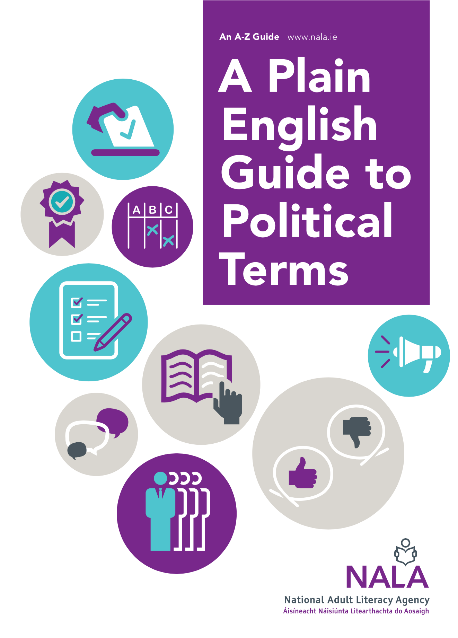Cutting Out Political Jargon During General Election 2020 Campaign
With the general election set for Saturday 8 February, we will be hearing a lot more about fresh mandates, manifestos, swing voters, fiscal space, building an Ireland for all and a future to look forward to – but not before the Government is dissolved – just like an aspirin!
In response to all this jargon, we at the National Adult Literacy Agency (NALA) have a ‘Plain English Guide’ to the way politicians and political commentators speak.
It explains the well-worn phrases used in election campaigns that are often misunderstood, such as the hustings, tallyman and marginal seat.
“Politics is awash with terms and phrases that are beloved of commentators and politicians alike. That’s why we wrote this guide – to help people to better understand what is being said. But we also encourage political parties to use less jargon and to be more aware of the issues faced by the 1 in 6 adults with literacy difficulties in Ireland. While political jargon allows politicians to talk about issues in a quicker, coded way, it can also act as a real barrier for people accessing information,” said Dr Inez Bailey, NALA CEO.
Here is a selection of some of the phrases from NALA’s Plain English Guide to Political Terms.
- Bandwagon effect: The tendency for a popular candidate or proposal to gather even more support simply because they appear to be winning; also called the “snowball effect”.
- Canvassing: Trying to win votes by contacting voters directly, for example, by going door to door.
- Mandate: The authority to represent people’s interests and take action on their behalf.
Using plain English also develops trust. Using everyday words and putting the needs of the person your communicating with first help you to get your message across and build a relationship.
NALA Plain English Open Training
If you want to beat the politicians at their own game, NALA offers a one-day training course in using Plain English. It can help you to quickly improve your writing for the page and web and help you reach a large audience. Plain English, like the Guide to Political Terms, helps make information more accessible and enables more people to participate in society.
The training will be from 9:30 to 15:30 in the Carmelite Community Centre, 56 Aungier St, Dublin 2 and it costs €130 or €110 for NALA members or charity workers. You can find more information and book on Upcoming Events at nala.ie. Contact sdriver@nala.ie with any questions.
One in six voters has difficulty reading
This plain English guide focuses on political terms as part of NALA’s ongoing campaign on literacy and political participation.
The most recent OECD survey of 6,000 Irish people showed that one is six adults has difficulty reading and understanding information. This has devastating consequences for individuals, society and the economy. Many of these individuals are in work, in low skilled jobs and are unequipped to deal with technological changes in the labour market.
The National Adult Literacy Agency (NALA) is seeking the support of all political parties for greater action on adult basic education – literacy, numeracy and digital skills. Specifically we are seeking the following commitments in their manifestos:
- Develop and implement a 10 year Whole-of-Government Strategy for adult literacy, numeracy and digital skills (to provide opportunities for those with the least education)
- Enact a Plain Language Bill to require that all information for the public from government and State bodies is written and presented in plain language (so that those with low literacy levels can access public information)
Over the coming weeks we will be asking our members, stakeholders and the general public to vote for political parties that want to support those will low basic skills – to create an equal society.
NALA is also offering support to all political parties to write the Executive Summary of their manifestos in plain English.
Watch the video by RTE on Political Jargon and Plain English featuring Dr Inez Bailey and members of the public below:

